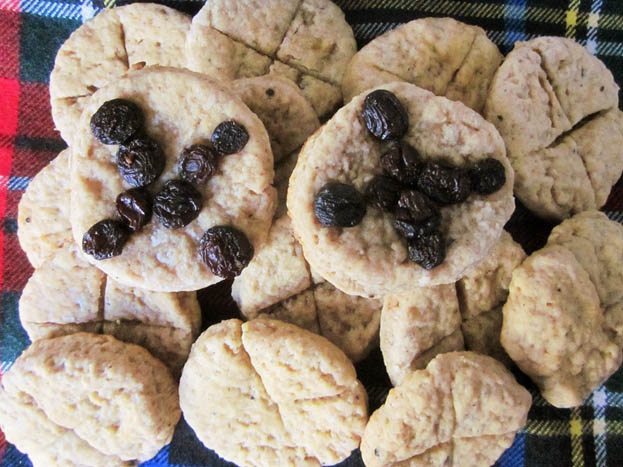A soul cake is a small, round, lightly-sweetened treat which has been made by Christians since the eighth century to commemorate the dead on All Hallows’ Eve, All Saints’ Day, or All Souls’ Day. However, scholars suggest that the idea emerged from earlier pre-Christian practices.
The aforementioned Christian holidays fall around the same time as the ancient Celtic festival of Samhain, which celebrated the end of summer and the harvest and the start of winter. The Celts believed that the dead returned to walk the earth for a night on the eve of their festival – and they wanted to keep the spirits happy to avoid problems. One way they accomplished this was to make offerings of food and drink to the departed.
Although not as well accepted, there is also a legend saying that the druids baked cakes around their harvest-time bonfires and used them in a deadly lottery. If you drew the one burnt cake in the pile, you were the human sacrifice in the coming year – but that story may also have been ancient propaganda!
By the eighth century, poor travelers who approached the local monastery around All Souls' Eve were given cakes that were consecrated and blessed. Christians exchanged the cakes they called “souls” for prayers. If a beggar or child, in this case known as a “souler,” offered to say prayers in November for the family's departed to help them out of Purgatory, they were paid with a cake – something many people saw as a fair trade.
And eventually, Christians also believed that the ancient rhymes that were sung and the actions of “Souling,” as the practice was called, were a more respectable alternative to the mummers who made merry and sought out food for their entertainment around the same time of year.
That’s when soul cakes gained new names and shapes – some were shortbread, others were fruit tarts – it really depended on the grains and ingredients available in the household and the baker’s preference. People often spiced up their souls with allspice, nutmeg, cinnamon, ginger, or other sweet spices, and added raisins or currants, usually in the form of a cross, to make it apparent that the cakes were used as alms.

Souling continued in England all the way from the Middle Ages until the 1930s. Protestant and Catholic Christians kept the tradition alive. Soul cakes can still be found in some parts of Portugal, Ireland, and the North-east of England. The recipes have largely changed to suit modern taste buds.




